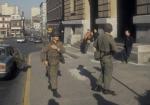The October Crisis, 1970 (Single lesson)
The Mission
During the 1960s Quiet Revolution, the Front de Libération du Québec (FLQ), a revolutionary nationalist movement, used propaganda and terror to promote the creation of an independent and socialist Québec country. Between 1963 and 1970, the FLQ was involved in over 200 crimes, including bank holdups, weapon robberies, and bombings. Six people, including one FLQ member, were killed in these violent operations. The kidnappings of British trade Commissioner James Cross on October 5, 1970, followed by Québec Minister of Labour Pierre Laporte on October 10 marked a crisis point that led to the "October Crisis."
Following a request of military assistance from Québec authorities, who feared an attempted rebellion, the federal government of Pierre Trudeau proclaimed the War Measures Act (WMA) on October 16. Under the provisions of the WMA, the FLQ was declared illegal, civil liberties were suspended, and arrests and detentions were more easily arranged.
More than thirty years after the events, the federal response to the FLQ continues to be deeply controversial in Canada. Was the use of the War Measures Act extreme or justified under the circumstances?
Examine the various official sources in the Virtual library and answer the analysis questions provided to you.
To acheive your objective, you need to use primary source as evidence. To know more about the concept of "primary source evidence" in history, consult The Historical Thinking Project
